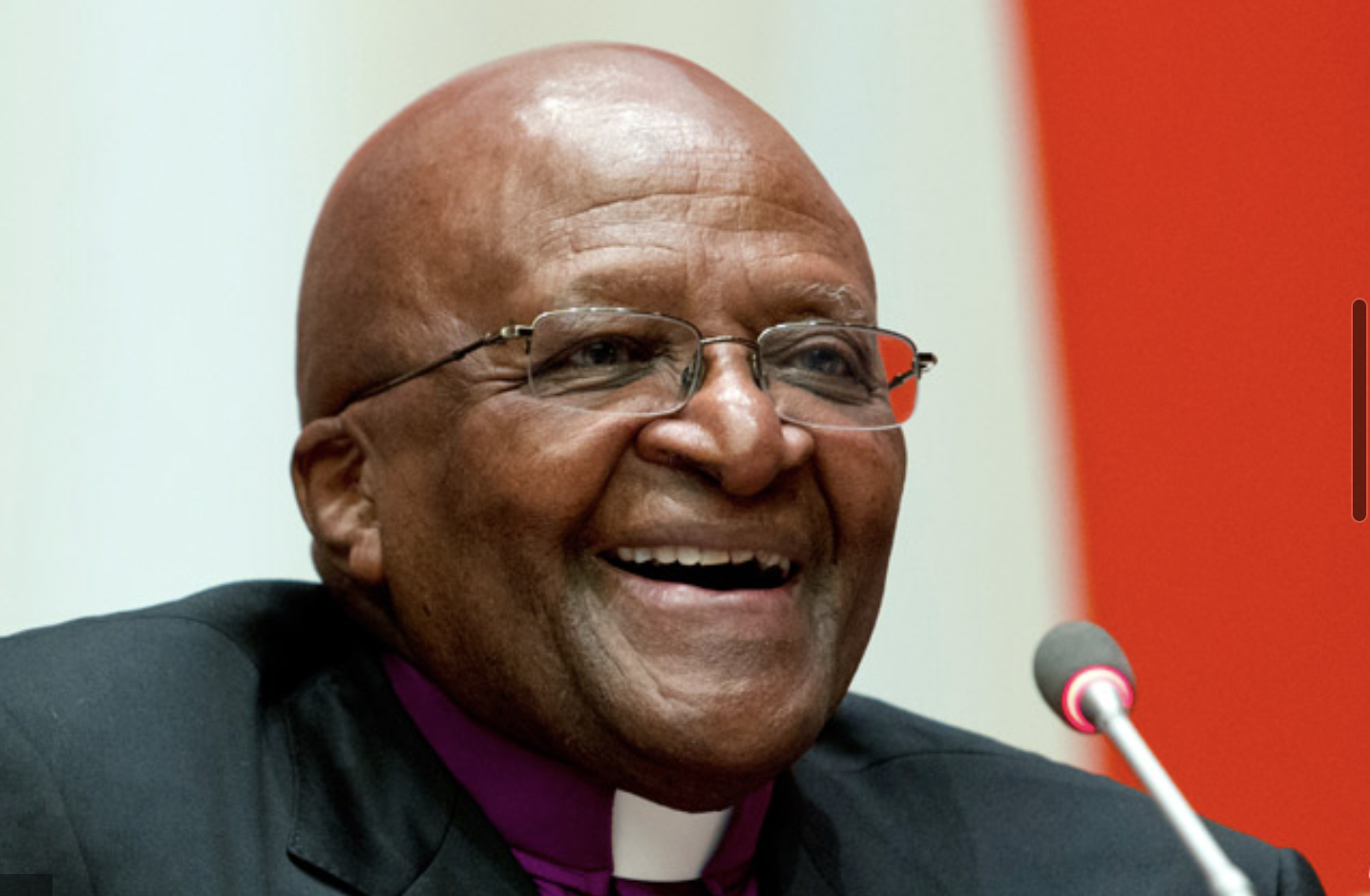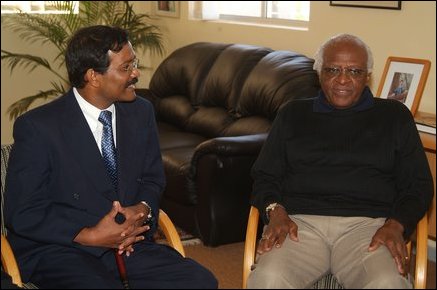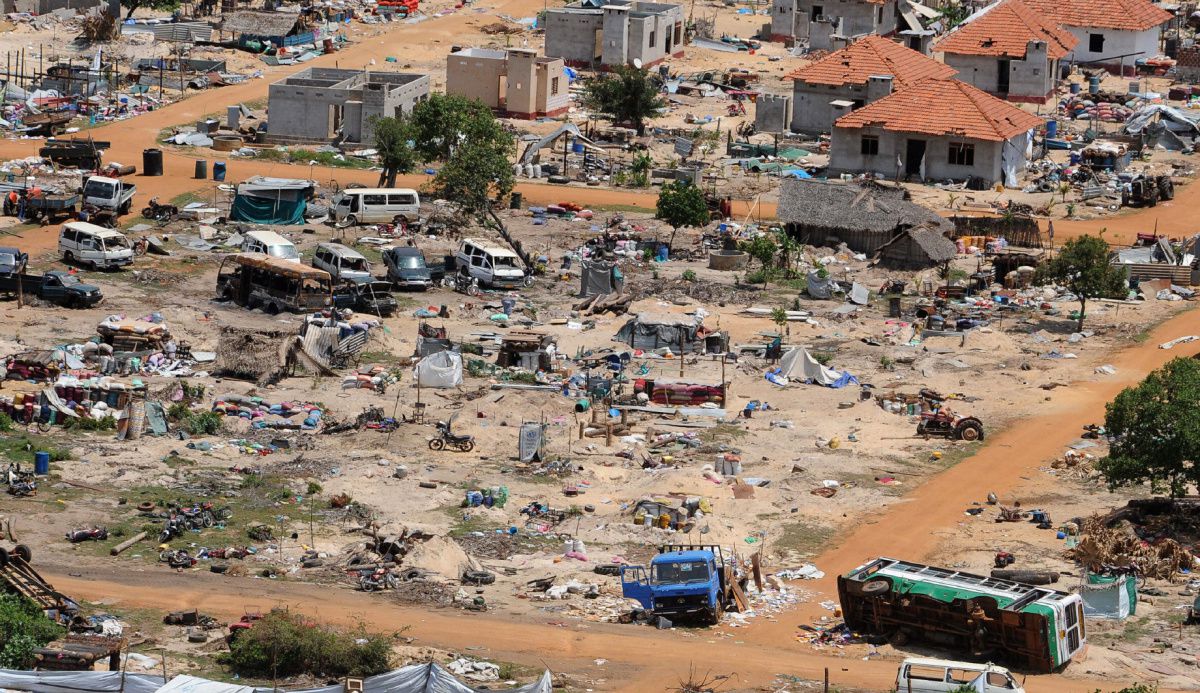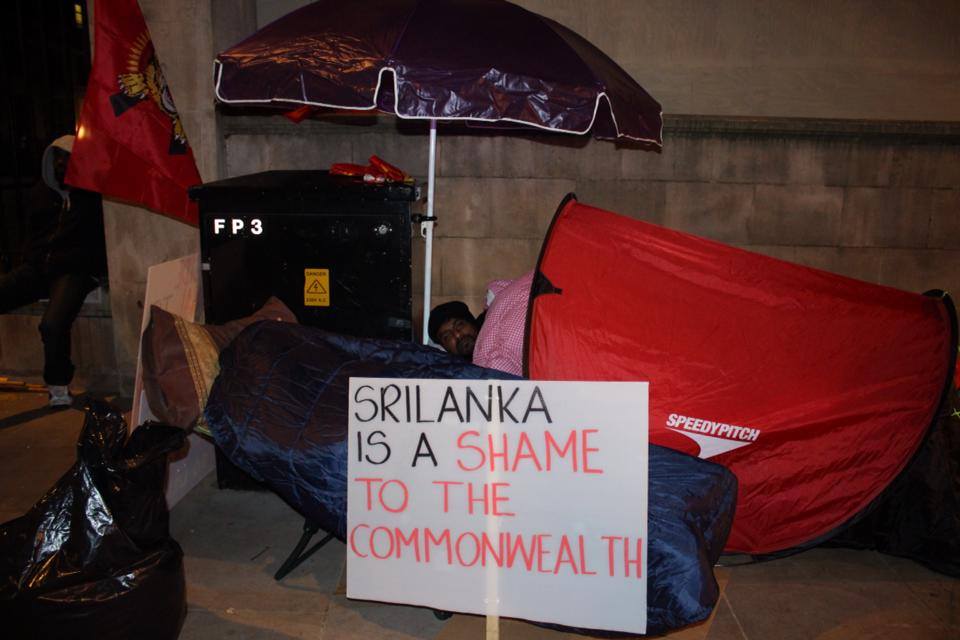
Last month, anti-apartheid leader Archbishop Desmond Tutu passed away aged 90.
We take a look at his association with the Tamil liberation struggle and calls for justice, equality and accountability in Sri Lanka.
Tutu was awarded the Nobel Peace Prize in 1984, for his role in the struggle to abolish the apartheid system in South Africa. Over a decade later, Nelson Mandela asked Tutu to chair the country's Truth and Reconciliation Commission, to gather evidence on crimes that took place during the aparthied-era.
Tutu later joined The Elders, an independent group of global leaders working for peace and human rights, and shifted his focus to global issues, including the armed conflict in Sri Lanka.
‘I will visit your people’

Desmond Tutu with LTTE political wing head, S P Thamilselvan. (Photograph: TamilNet).
In 2005, a delegation from the Liberation Tigers of Tamil Eelam (LTTE), led by political wing head S P Thamilselvan, met with Tutu in Cape Town.
"Recalling from experience in the South African context, the Archbishop said that holding on to the cease fire to such a long time as three years clearly demonstrates that the LTTE cares for the people and wished that the parties should endeavor to reach a political settlement early," a news release by the LTTE Peace Secretariat said.
"If time and health permits, I will visit your people to see for myself their plight", the Peace Secretariat quoted Tutu as saying.
'God weeps for Sri Lanka'
In a 2006 speech, Tutu evoked the image of God when he mentioned Sri Lanka amongst other conflict zones and atrocities that had taken place around the world.
"God weeps when God sees the kinds of things that you and I inflict on one another," he said. "God weeps when God sees a holocaust over there, a genocide in Rwanda, in Darfur, in Zimbabwe, in Sri Lanka, in the Middle East, in Northern Ireland. And God says sometimes, “What ever got in my head to create that lot?”"
‘Abuses by Sri Lanka are among the most serious imaginable’
In 2008, Tutu joined other Nobel Peace Prize winners and called on UN members to reject Sri Lanka’s candidacy for the UN Human Rights Council.
“The systematic abuses by Sri Lankan government forces are among the most serious imaginable,” Tutu declared.
“Governments owe it to Sri Lankan human rights victims – and to victims of human rights abuses around the world – to ensure that the Sri Lankan bid fails.”
The Mullivaikkal massacres

In March 2009, Tutu alongside other leading scholars called on the British government to press for an urgent UN Security Council resolution to protect civilians as Sri Lanka ramped up it's military offensive in the North-East.
"The deteriorating humanitarian and human rights situation throughout the war-afflicted areas of northern and eastern Sri Lanka warrants immediate attention and action by the Security Council. An armed conflict entailing widespread and serious abuses continues in these areas. Calls for all sides to exercise restraint and respect international humanitarian and human rights law remain unheeded," the letter said.
The alleged abuses are being carried out with total impunity and include serious and indiscriminate violations of international humanitarian law," it added.
‘No peace without trust’

Arunachalam Camp, Menik Farm, 19 August 2009
Following the end of the armed conflict, where tens of thousands of Tamils were massacred by the state forces, Tutu wrote a direct appeal to then President Mahinda Rajapaksa, urging him to protect the rights of internally displaced persons who remained in camps. For over six months, after the bloody end to Sri Lanka’s military offensive, those trapped in camps were not allowed to enter or leave them.
"No sustainable peace is possible without trust. Having won a military victory, the Sri Lankan government must not squander its gains. It has an obligation to serve all Sri Lanka’s citizens – including the Tamil and other minority communities," Tutu said.
"Sri Lanka needs wise, far-sighted and determined leadership to help end the divisions of the past and achieve genuine reconciliation, peace and dignity, to the benefit of all of Sri Lanka’s people."
‘Little chance of truth or reconciliation’
Writing in The Guardian a year after the conflict, Tutu highlighted that the Lessons Learnt and Reconciliation Commission appointed by Mahinda Rajapaksa was “not nearly enough” to address the vast number of atrocities perpetrated by the state.
“There is no indication, as yet, that the commission intends to hold anyone to account for any violations of domestic or international law,” he added.
“Without a clear mandate for legal accountability, the commission has little chance of producing either truth or reconciliation. Nor will victims and witnesses feel safe in giving evidence,” he stated.
'Absence of war is not peace'
Writing in the Times of India alongside the former Irish President Mary Robinson, Tutu stated that the "climate required for reconciliation does not yet exist" in Sri Lanka and urged the Commonwealth to “seriously reconsider appointing Sri Lanka as its chair for 2013-15".
"Other crises have flared in the past year. Syria and Mali, to take two obvious examples, rightly figure high on the Council's agenda,” they said.
The case of Sri Lanka offers a different test: of the Council's ability to hold governments accountable even when global attention has turned elsewhere.'
Boycotting Sri Lanka

Tamil protester on hunger strike in 2013, calling on British PM to boycott CHOGM. (Photograph: TYO UK).
In the lead up to the Commonwealth Heads of Government meeting (CHOGM) in Sri Lanka, Tutu suggested a boycott of the meeting could help pressure Colombo to address alleged war crimes against Tamils.
Speaking to journalists in New Delhi, Tutu said:
“If there are enough reasons to suggest that the Sri Lanka government have not been doing things with integrity, I think the world has to apply all the screws it can…And a boycott of CHOGM could be one of them.”
A call for UN Commission of Inquiry
Ahead of the 2014 UN Human Rights Council Session, Tutu and 38 activists wrote to the UN, demanding an international investigation to end Sri Lanka’s culture of impunity and “to climb out of the cycle of violence towards a lasting peace.”
“We, concerned individuals and organisations from around the world, urge the UN Human Rights Council (UNHRC) to use their March 2014 session to pass a resolution that will include a commitment to an Independent International investigation in the form of a Commission of Inquiry. Only this will help to put the country on the path to justice and reconciliation,” the joint statement said.
“Post-conflict processes do take time, but what matters is getting on the right path. Nearly five years after the war ended, the situation appears to be getting worse, not better.”
Calls for international accountability
![]()
Tutu criticised Sri Lanka for not addressing accountability in it’s LLRC report and for the lack of impartiality in investigations into the human rights abuses, stating that Sri Lankan army intending to “investigate its own actions during the conflict is not the kind of independent inquiry that is required.”
Tutu also called on the UN Human Rights Council to use the 2012 sessions to “uphold human rights law and international humanitarian law” and urged “council members to support the establishment of an independent investigation.”
'A true friend'
Following his death, numerous global Tamil diaspora organisations paid tribute to the life of human rights advocacy and justice lived by Tutu and his continued support for the Tamil nation.
“Archbishop Tutu has always been our inspiration to provide guidance and leadership to exert political pressure on Sri Lanka to end its national oppression of the Tamil nation with genocidal intent. Archbishop Tutu not only spoke loud for justice but has always matched it with his own and collective actions” the statement read.
